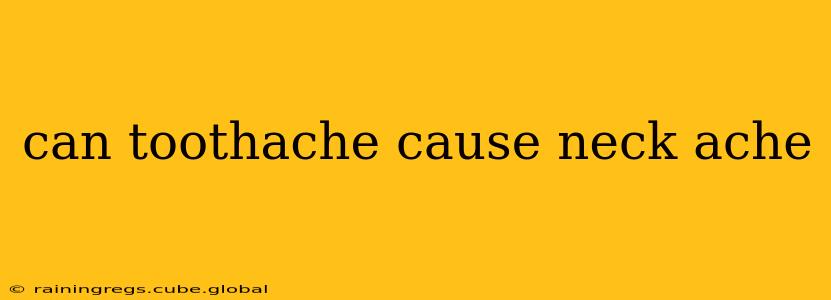Can a Toothache Cause a Neck Ache? Understanding the Connection
Yes, a toothache can absolutely cause neck pain. While it might seem like an unlikely connection, the intricate network of muscles, nerves, and even the structure of your jaw and skull can explain why a seemingly isolated tooth problem can lead to pain radiating to your neck. This isn't just a matter of coincidence; there are several plausible mechanisms at play.
Understanding the Anatomy: Why Tooth Pain Can Spread
To grasp the link between a toothache and neck pain, we need to understand the anatomy of the head and neck. The trigeminal nerve, a major cranial nerve, plays a crucial role. This nerve's branches innervate (supply sensation to) your face, including your teeth, jaw, and even parts of your neck and scalp. When you experience a toothache, the pain signals travel along the trigeminal nerve. Because of the nerve's extensive network, pain isn't always localized to the source. Instead, it can radiate or refer to other areas, including your neck and jaw.
Mechanisms Linking Toothaches and Neck Pain:
-
Referred Pain: As mentioned above, referred pain is the most common explanation. Pain signals from the teeth can be misinterpreted by the brain as originating from the neck, due to the shared neural pathways. The brain struggles to pinpoint the exact source of the intense nerve stimulation.
-
Muscle Tension: A toothache often leads to involuntary clenching or grinding of your teeth (bruxism). This sustained muscle activity can strain the muscles of your jaw and neck, causing tension headaches and neck pain. The temporomandibular joint (TMJ), which connects your jaw to your skull, can also be affected, leading to TMJ disorder and associated neck discomfort.
-
Inflammation: Severe dental infections can cause significant inflammation. This inflammation isn't confined to the tooth; it can spread to surrounding tissues, potentially affecting muscles and nerves in the neck region, causing pain and stiffness.
-
Postural Changes: The pain from a toothache might cause you to unconsciously alter your posture, perhaps tilting your head to alleviate pressure. These postural changes, if maintained, can lead to muscle strain and neck pain.
Frequently Asked Questions (FAQ):
H2: Does a toothache always cause neck pain?
No, a toothache doesn't always cause neck pain. Many people experience localized pain solely in the affected tooth. However, the likelihood of referred pain increases with the severity of the toothache and the underlying cause. A severe infection or significant inflammation is more likely to cause radiating pain.
H2: How long does neck pain from a toothache last?
The duration of neck pain associated with a toothache varies depending on the underlying dental issue and its treatment. If the toothache is addressed promptly, the neck pain might subside relatively quickly once the dental problem is resolved. However, if the underlying infection or inflammation persists, the neck pain could linger.
H2: How can I treat neck pain caused by a toothache?
Treating the neck pain directly might provide temporary relief but won't address the root cause. The primary focus should be on addressing the underlying toothache. This typically involves a visit to a dentist for diagnosis and treatment. Once the dental problem is resolved, the neck pain will often improve. Over-the-counter pain relievers like ibuprofen can help manage both toothache and neck pain in the meantime, but these should be used responsibly. Gentle neck stretches and warm compresses might also offer temporary relief from the muscle tension, but seeking professional dental care is crucial.
H2: Can a dentist treat neck pain related to a toothache?
While a dentist can't directly treat the neck pain itself, treating the underlying dental issue is the most effective way to resolve associated neck pain. They'll diagnose the problem, perform necessary dental procedures (such as root canal therapy or extraction), and recommend appropriate pain management strategies. In cases where the neck pain is persistent even after dental treatment, your dentist might suggest consulting a physician or physical therapist.
Conclusion:
The connection between toothache and neck ache is a valid one, often stemming from referred pain caused by the trigeminal nerve's extensive network. While the neck pain might seem separate, addressing the underlying dental issue is paramount for resolving both problems. Don't ignore a persistent toothache; seek professional dental care promptly to prevent complications and alleviate both the tooth and neck pain effectively.
